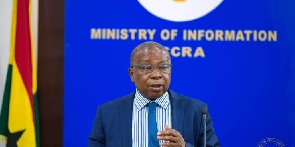 Health Minister, Kwaku Agyeman Manu
Health Minister, Kwaku Agyeman Manu
A joint research conducted on Ghana’s implementation of the World Health Organisation’s (WHO) three-Pillar Module, of the “Test, Treat and Track” (Three-Ts) Policy for malaria, has shown great progress in the first two pillars.
However, the tracking aspect by healthcare providers - to ensure adherence to prescriptions given to clients, monitoring their response to the treatment, and also their unwillingness to go back for reviews at facilities -was found to be lacking.
The researchers, therefore, recommended improved funding by the Government, frequent training of healthcare staff at the lower level, especially the Community-Based Health Planning and Services (CHPS) Compounds, and intensified monitoring by District and Municipal Health Directorates by devising tracking systems contextual to urban and peri-urban facilities for cost effectiveness.
Ms Charlotte Tawiah Agyemang, representing the Kintampo Health Research Centre, at a policy dissemination workshop in Accra on Tuesday, said realising the critical need for assessing the Three-Ts Policy, seven years after its implementation by the Ghana Health Service in 2013, a research partnership was formed, to review and identify any possible gaps, and help in addressing them.
She introduced the research partners as the Alliance for Reproductive Health Rights (ARHR) representing civil society, the Anglican Diocesan Development and Relief Orgainsation (ADDRO) for religious, and the Kintampo Health Research Centre, with funding from the COMIC Relief.
Ms Agyemang said there was still a lot to be done considering the numerous gaps that were identified in the efforts to control malaria, and called for massive stakeholder involvement, especially, regarding issues of the environment, elimination of the breeding grounds of mosquitoes, proper use of Insecticide Treated bed Nets, and strict adherence to prescribed medication, for effective treatment.
Nii Ankonu Annorbah Sarpei, the Programmes Manager for the ARHR, said the overall objective of the study was to highlight the gaps within the system with respect to malaria care, adding that, although the Policy, recommended adherence to all the Three-Ts of malaria care, some of the facilities sampled were found to be confronted with challenges such as non-availability of or expired of Rapid Diagnostic Test (RDT) kits, and absence of laboratories.
This, he said created a vacuum for proper diagnoses, and some were compelled to rely on signs and symptoms of patients for treatment, with the lack of funding being the major explanations given by the majority of the healthcare workers and District Health Directorates in the sampled areas, for the low tracking rate.
He urged the Government agencies responsible, to ensure that facilities were always well stocked with important healthcare consumables if Ghana was to realise the full impact of the Three-Ts Policy.
Mr Francis Agbokey, a Research Fellow with the Kintampo Health Research Centre, in a presentation, said the study was conducted in six selected districts across three ecological zones within the Northern, Middle and Southern belts, with variations to ensure a well representation.
They included districts and municipalities in West Mamprusi, Jirapa, Kintampo, Mporhor, as well as Nzema East respectively, where a total of 590 clients from 31 health facilities, made up of the Community-Based Health Planning and Services (CHPS) Compounds, Health Centres and Hospitals, participated in the study.
The study, he said ascertained that there was high knowledge among both healthcare workers and clients regarding the Three-T Policy and spoke about the use of the Community Scorecards as an effective tool for data collection during the research.
He said the partners would engage with policy makers to present the findings and together help in filling the identified gaps with evidenced-based approach towards malaria control.
Dr Robert Kuganab, the Member of Parliament for Binduri, and Ranking Member of the Health Committee commended the research partners for the good work done, saying, the study had provided evidence on what was working and not, through a broad national perspective of what was being done as far as the control and elimination of malaria was concerned.
He urged the researchers to move the study further, by considering themselves as key stakeholders in the implementation of the recommendations.